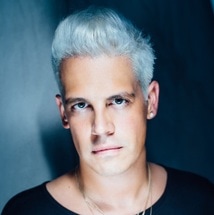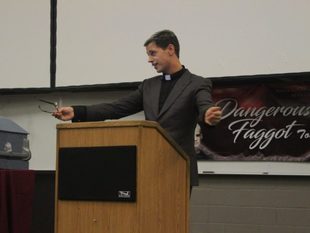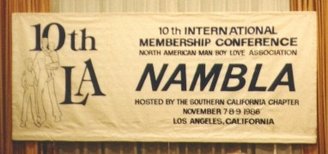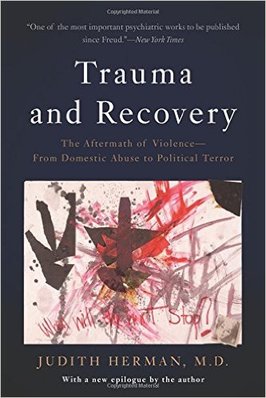
I don’t want to spend one second more time on this subject than is absolutely, bare-bones necessary to interject the perspective of a survivor of child sexual abuse who has spent three decades working with the art and culture of other survivors in recovery.
In a nutshell, Milo is a British journalist and public speaker. He got in a lot of trouble this week when a conservative website posted excerpts of a video that he made in a January 2016 episode of the podcast Drunken Peasants.
Here is a transcript from that video from the website heavy.com.:
The men in the joint video interview then discuss Milo’s experience at age 14.
Another man says: “The whole consent thing for me. It’s not this black and white thing that people try to paint it. Are there some 13-year-olds out there capable of giving informed consent to have sex with an adult, probably…”
The man says, “The reason these age of consent laws exist is because we have to set some kind of a barometer here, we’ve got to pick some kind of an age…”
Milo: “The law is probably about right, that’s probably roughly the right age. I think it’s probably about okay, but there are certainly people who are capable of giving consent at a younger age, I certainly consider myself to be one of them, people who are sexually active younger. I think it particularly happens in the gay world by the way. In many cases actually those relationships with older men…This is one reason I hate the left. This stupid one size fits all policing of culture. (People speak over each other). This sort of arbitrary and oppressive idea of consent, which totally destroys you know understanding that many of us have. The complexities and subtleties and complicated nature of many relationships. You know, people are messy and complex. In the homosexual world particularly. Some of those relationships between younger boys and older men, the sort of coming of age relationships, the relationships in which those older men help those young boys to discover who they are, and give them security and safety and provide them with love and a reliable and sort of a rock where they can’t speak to their parents. Some of those relationships are the most -”
“It sounds like Catholic priest molestation to me, another man says, interrupting Milo.
Milo: “And you know what, I’m grateful for Father Michael. I wouldn’t give nearly such good head if it wasn’t for him.”
Other people talk. “Oh my God, I can’t handle it,” one man says. “The next thing in line is going to be pedophilia,” says another man.
Milo: “You’re misunderstanding what pedophilia means. Pedophilia is not a sexual attraction to somebody 13-years-old who is sexually mature. Pedophilia is attraction to children who have not reached puberty. Pedophilia is attraction to people who don’t have functioning sex organs yet. Who have not gone through puberty. Who are too young to be able..” [audio unclear and cut off by others]… “That’s not what we are talking about. You don’t understand what pedophilia is if you are saying I’m defending it because I’m certainly not.”
Another man said, “You are advocating for cross generational relationships here, can we be honest about that?”
Milo: “Yeah, I don’t mind admitting that. I think particularly in the gay world and outside the Catholic church, if that’s where some of you want to go with this, I think in the gay world, some of the most important, enriching and incredibly life affirming, important shaping relationships very often between younger boys and older men, they can be hugely positive experiences for those young boys. They can even save those young boys, from desolation, from suicide…” [People talk over each other] “… providing they’re consensual.”

So that was Milo a year ago. Also last year, he showed up for a college booking wearing a clerical collar and opened with, “Thank you, thank you. Aren’t you kind. I know what you’re thinking. If every priest looked like this, those little boys would stop complaining.”
As of this week, he has just he has just lost a quarter-million dollar book deal, his job as a Breitbart editor, and an invitation to speak at a national conference. It appears that his career may be ended. So… here is the damage control from yesterday’s press conference:
Let’s parse that paragraph… The relationship to the abusers is “complicated,” because he had been led to believe that what was happening was not abuse. That’s pretty standard. But, good for him, he can now look back and see that it was. But then: “I still don’t view myself as a victim.” Hmm… That would appear to be a pretty huge disconnect. And then, “But I am one.” Sounds like the first tentative step toward a long and fraught recovery.
He ends with, “Looking back, I can see the effects it had on me. In the years after what happened, I fell into alcohol and nihilistic partying that lasted well into my late 20s.”
Again, good for him. Unquestionably three years’ of sexual abuse at the hands of two abusers would contribute to those behaviors. But what about his early thirties? (He’s currently thirty-three.) Does he believe that, without recovery and/or a substantial reframing of the experience, this history no longer influences his behavior?
I would submit that Milo has only begun to scratch the surface of the degree to which his sexual abuse has affected him. I believe that his identification with the interests and perspectives of cultural perpetrators across a vast spectrum of oppressions informs his identity, and that what he refers to as a career is actually a compulsion. In fact, he calls Trump “Daddy.” This is all the more interesting in light of the fact that he has referred to his father as “terrifying.”
There is nothing edgy or courageous about deploying hate speech in a cultural climate that is fostering witchhunts on multiple fronts. There is nothing radical about bullying—especially when there is a bully in the White House.

NAMBLA’s position was that male sexual predation on male children is integral to the Western homosexual tradition, “from Socrates to Wilde to Gide,” and that this predation was practiced in gay cultures from “New Guinea and Persia to the Zulu and Japanese.” In NAMBLA’s view, child sexual abuse is central to gay male history and culture.
The argument that Milo presented in his 2016 video, that these “relationships” can be enriching and affirming was part of the standard cant in many gay male papers that framed anti-pedophilia activists as sexual puritans bent on denying children their “right” to "sex" with adults. Two of the founding fathers of post-modernism, Derrida and Foucault, both participated in a public campaign in France to abolish age of consent. Abolish, not lower.
Milo was victimized by more than just two sick men. He was victimized by a movement and by a community. And, after he came of age with this legacy of abuse and the toxic ideology that perpetuates it, he was further abused by a culture that has and continues to incentivize his dissociation.

“Many abused children cling to the hope that growing up will bring escape and freedom.
But the personality formed in the environment of coercive control is not well adapted to adult life. The survivor is left with fundamental problems in basic trust, autonomy, and initiative. She approaches the task of early adulthood―establishing independence and intimacy―burdened by major impairments in self-care, in cognition and in memory, in identity, and in the capacity to form stable relationships.
She is still a prisoner of her childhood; attempting to create a new life, she reencounters the trauma.”
And…
"The psychological distress symptoms of traumatized people simultaneously call attention to the existence of an unspeakable secret and deflect attention from it. This is most apparent in the way traumatized people alternate between feeling numb and reliving the event. The dialectic of trauma gives rise to complicated, sometimes uncanny alterations of consciousness, which George Orwell, one of the committed truth-tellers of our century, called 'doublethink,' and which mental health professionals, searching for calm, precise language, call 'dissociation.' It results in protean, dramatic, and often bizarre symptoms of hysteria which Freud recognized a century ago as disguised communications about sexual abuse in childhood. . . .”
And…
“By developing a contaminated, stigmatized identity, the child victim takes the evil of the abuser into herself and thereby preserves her primary attachments to her parents. Because the inner sense of badness preserves a relationship, it is not readily given up even after the abuse has stopped; rather, it becomes a stable part of the child's personality structure.”
 Dr. Judith Herman
Dr. Judith Herman “...repeated trauma in childhood forms and deforms the personality. The child trapped in an abusive environment is faced with formidable tasks of adaptation. She must find a way to preserve a sense of trust in people who are untrustworthy, safety in a situation that is unsafe, control in a situation that is terrifyingly unpredictable, power in a situation of helplessness. Unable to care for or protect herself, she must compensate for the failures of adult care and protection with the only means at her disposal, an immature system of psychological defenses.” (My emphasis.)
In an interview last year with Fusion, Milo explained how his media personality evolved: “I didn’t like me very much and so I created this comedy character." To the New York Times, he admitted, "I don’t have feelings to hurt.”
Several journalists who spent time with him have noted that he does not actually believe most of the things he says. I compare this with the words of African American author and activist Toni Cade Bambara: "I try to take seriously acts of language. Words set things in motion. I've seen them doing it. Words set up atmospheres, electrical fields, charges. I've felt them doing it... I'm careful about what I give voice to."
A child who is taught that his abuse is empowerment will have great difficulty achieving authenticity of voice--or "freedom of speech," if you will. It follows that the person who is still trapped in a paradigm of protecting his own oppression will have little empathy for the vicitimization of others. The followers of Milo who hold him up as a champion of free speech have been hoodwinked. His is the most censored voice of all, the voice of the child who has internalized the affect of the perpetrator. Freedom's just another word for nothing left to lose when words have lost their meaning.
So, Milo, if you are entering on a path of recovery as a result of this week's events--and I hope you are, I challenge you to undertake an action that is authentically dangerous, taking these words of Dr. Herman to heart:
"Those who stand with the victim will inevitably have to face the perpetrator's unmasked fury. For many of us, there can be no greater honor."

 RSS Feed
RSS Feed
